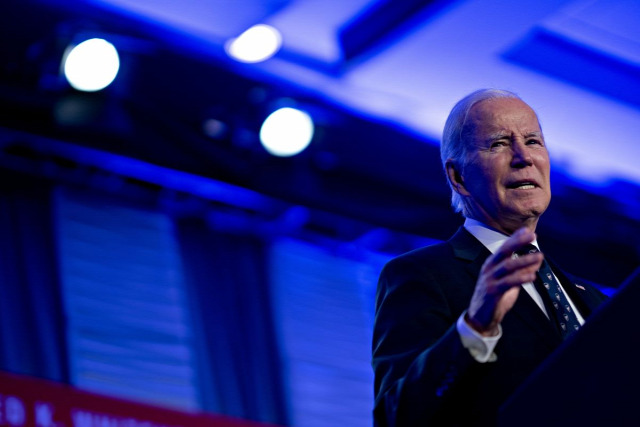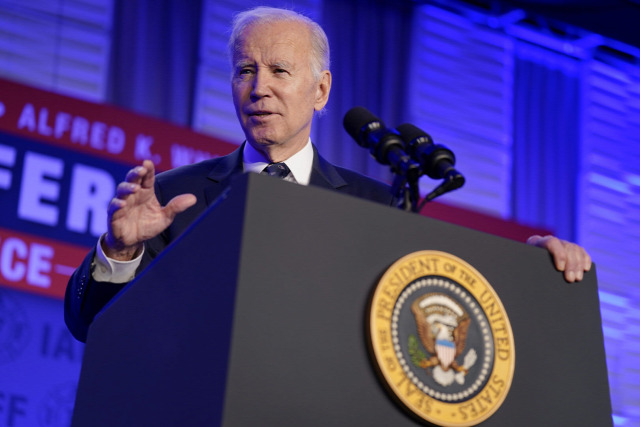A US presidential veto of congressional legislation is a big moment. Joe Biden is expected to issue the first veto of his presidency to preserve a White House rule allowing fiduciaries of private companies’ pension funds to include environment, social and governance considerations in their investment decisions. Cue brickbats from opponents of ESG over Biden supposedly imposing “woke capitalism”. But the rule only permits, but does not compel, managers to take ESG into account — and the president is defending sound investment principles.

The battle over the investment rule is emblematic of a broader backlash against ESG investing. Republicans and other opponents charge that applying ESG principles may put retirement savings on a sub-par footing. They say fiduciaries could use investments to promote a liberal agenda. Joe Manchin, one of two Democratic senators who sided with Republicans in opposing the White House rule, said it “prioritises politics over getting the best returns”.
The regulation has become a game of ping-pong. The Trump administration in 2020 made it harder for workplace retirement plans to explicitly consider factors such as climate risks. The Biden administration replaced that rule with one easing the way for fiduciaries to consider ESG factors that might affect investment performance. Republican lawmakers used a congressional power of review to strike down the White House rule.
The federal stand-off comes as many Republican-run states are pulling money from big asset managers that have supported sustainable investment policies. Ron DeSantis, the Florida governor, has moved to bar state-run fund managers from taking ESG factors into consideration in investments. In some states, anti-ESG laws have been motivated by claims that asset managers are discriminating against powerful local industries, from oil and gas to coal or firearm makers.

The ESG industry remains flawed. It lacks clearly defined standards of measurement and performance, opening the door to “greenwashing” and other cynical practices. Compelling money managers to be bound by its dictates would be misguided. The White House rule contains no compulsion, however. It merely allows fiduciaries to take ESG considerations into account as part of a prudent strategy. And asset managers increasingly realise that earning the best returns, and avoiding losses, means considering all risks and externalities related to any investment. Company values can be affected by more than just financial performance.
200. CONSPIRACY THEORY
201. COOKING
202. COP
203. CORPSE
204. CORRUPTION
205. COUNTRY MUSIC
206. COUNTRYSIDE
207. COUPLE
208. COURT CASE
209. COURTROOM
210. COWBOY
211. CREATURE
212. CRIMINAL
213. CUBA
214. CULT
215. CULT FILM
216. CULTURE
217. CURSE
218. CYBERPUNK
219. CYBORG
220. CYCLING
221. DANCE
222. DANCER
223. DANCING
224. DARK COMEDY
225. DATING
226. DAUGHTER
227. DC COMICS
228. DEATH
229. DEBT
230. DECAPITATION
231. DECEPTION
232. DEMON
233. DENMARK
234. DEPRESSION
235. DESERT
236. DETECTIVE
237. DEVIL
238. DIAMOND
239. DINOSAUR
240. DISABILITY
241. DISAPPEARANCE
242. DISASTER
243. DISEASE
244. DISGUISE
245. DIVORCE
246. DOCTOR
247. DOCUDRAMA
248. DOCUMENTARY FILMMAKING
249. DOG
250. DOMESTIC VIOLENCE
251. DRAG QUEEN
252. DRAGON
253. DREAM
254. DRUG ABUSE
255. DRUG ADDICTION
256. DRUG DEALER
257. DRUG TRAFFIC
258. DRUG USE
259. DRUGS
260. DUEL
261. DURINGCREDITSSTINGER
262. DUTCH CABARET
263. DYING AND DEATH
264. DYSFUNCTIONAL FAMILY
265. DYSTOPIA
266. EARLY 1900S
267. EARTHQUAKE
268. ECONOMICS
269. EDUCATION
Companies are under pressure from sections of society to adopt climate-friendly policies, pursue positive social goals and promote diversity and inclusion in the workplace. They face constant scrutiny from social media, activists and proxy groups. But there are already safeguards against pension managers using ESG as cover to pursue political agendas. The legislation underlying the new rule explicitly requires fiduciaries to act prudently and in the financial interests of pension plan participants.
A Biden veto will ensure company pension plans can take ESG into account. Republican-run states will still have the right to bar public pension funds from doing so. But they should be wary of how they exercise that power. An Indiana fiscal watchdog last month estimated that, by restricting fund managers’ options, a proposed state law limiting their use of sustainable investment factors could reduce returns of the public pension system by $6.7bn over a decade. Blocking some investment considerations not only amounts to interference in the market of a kind Republicans have long claimed to oppose. It could also result in the opposite of what is intended.

